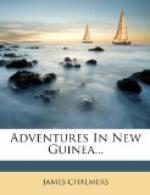We walked about seven miles through bush, and then began the ascent of one of the spurs of the Astrolabe. On nearing the inland village for which we were bound, the natives became somewhat afraid, and the leader stopped, and, turning to Mr. Lawes, asked him if he would indeed not kill any of the people. He was assured all was right, and then he moved on a few paces, to stop again, and re-inquire if all was right. When reassured, we all went on, not a word spoken by any one, and so in silence we entered the village. When we were observed, spears began rattling in the houses; but our party shouted, Maino, maino (Peace, peace), Misi Lao, Misi Lao. The women escaped through the trap-doors in the floors of their houses, and away down the side of the hill into the bush. We reached the chief’s house, and there remained.
The people soon regained confidence, and came round us, wondering greatly at the first white men they had ever seen in their village. The women returned from their flight, and began to cook food, which, when ready, they brought to us, and of which we all heartily partook. We gave them presents, and they would not suffer us to depart till they had brought us a return present of uncooked food. They are a fine, healthy-looking people, lighter than those on the coast. Many were in deep mourning, and frightfully besmeared. There are a number of villages close by, on the various ridges. We returned by a different way, following the bed of what must be in the rainy season a large river. The banks were in many places from eight to nine feet high.
On the following morning, November 3rd, we weighed anchor and set sail, passing Kapakapa, a double village in the sea. The houses are large and well built. There are numerous villages on the hills at the back of it, and not too far away to be visited. We anchored off Round Head, which does not, as represented on the charts, rise boldly from the sea. There is a plain between two and three miles broad between the sea and the hill called Round Head. There are many villages on the hills along this part of the coast. We anchored close to the shore. A number of natives were on the beach, but could not be induced to visit us on board. We went ashore to them after dinner. They knew Mr. Lawes by name only, and became more easy when he assured them that he was really and truly Misi Lao. They professed friendship by calling out, Maino, maino, catching hold of their noses, and pointing to their stomachs. After a little time, two ventured to accompany Mr. Lawes on board, and received presents. I remained ashore astonishing others by striking matches, and showing off my arms and chest. The women were so frightened that they all kept at a respectful distance. These are the natives from an inland village that killed a Port Moresby native about the beginning of the year. When those who accompanied Mr. Lawes on board the Mayri returned to the shore, they were instantly surrounded by their friends, who seized the presents and made off. They had received fish, biscuit, and taro. The taro and fish were smelt all over, and carefully examined before eaten. The biscuit was wrapped up again in the paper.




